Graduating with a PhD in aerospace from the University of Sydney (Australia) in 1974, Associate Professor Dr. Nguyen Thien Tong returned to Vietnam and became a lecturer at the University of Technology, Thu Duc Polytechnic Institute (now the University of Technology, Ho Chi Minh City National University).
Over the past 50 years, his work has been closely associated with the university environment, so he has clearly seen every step of development of the Vietnamese university education system.
More and more PhD graduates from abroad
Having worked at many public and private universities, Associate Professor, Dr. Nguyen Thien Tong believes that university education in the country in general and in Ho Chi Minh City in particular after 50 years has many outstanding achievements demonstrated by numbers.
First of all, we must mention the remarkable development in the scale of university training and the rate of people accessing this level of education. Statistics from 2021 - 2023 of the Ministry of Education and Training show that the rate of university students out of the number of people aged 18 - 22 in Vietnam is from 27.9% to approximately 30%.
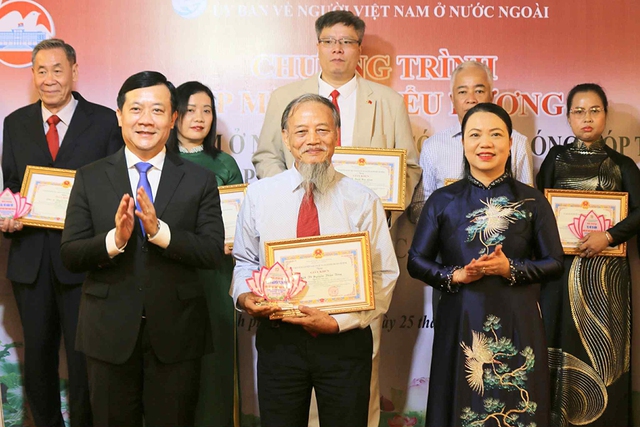
Associate Professor, Dr. Nguyen Thien Tong ( middle, front row ) is one of 50 outstanding overseas Vietnamese honored by Ho Chi Minh City on the occasion of the 50th anniversary of national reunification.
PHOTO: PHAM THU NGAN
In Ho Chi Minh City alone, according to Decision No. 192 approving the city's Education Development Strategy to 2030, with a vision to 2045, by 2025, 12% of the population will have attained university degrees. Another statistic from the Ministry of Education and Training also shows that Ho Chi Minh City is one of the three localities with the highest rate of high school graduates and university students in the country in recent years.
According to Associate Professor, Dr. Nguyen Thien Tong, a bright spot of current university education is the teaching staff. The number of lecturers graduating from master's and doctoral programs abroad is increasing, including universities where the proportion of lecturers graduating from domestic doctoral programs is only a very small percentage. With attractive policies, both public and private universities are becoming the destination for foreign-graduated doctors.
"Despite the strong increase in quantity and the schools not achieving uniform high quality, university education has some notable bright spots, specifically international training programs right in Vietnam," Associate Professor, Dr. Nguyen Thien Tong further affirmed. These are international programs taught entirely in English at prestigious universities with teaching staff including foreign professors and Vietnamese lecturers with PhDs abroad. The training programs and curriculum are the same as those at foreign universities.
"No longer international programs with high tuition fees and lower benchmark scores than mainstream programs, international programs taught entirely in English in recent years have been attracting excellent students with quite high benchmark scores," Associate Professor, Dr. Nguyen Thien Tong assessed.
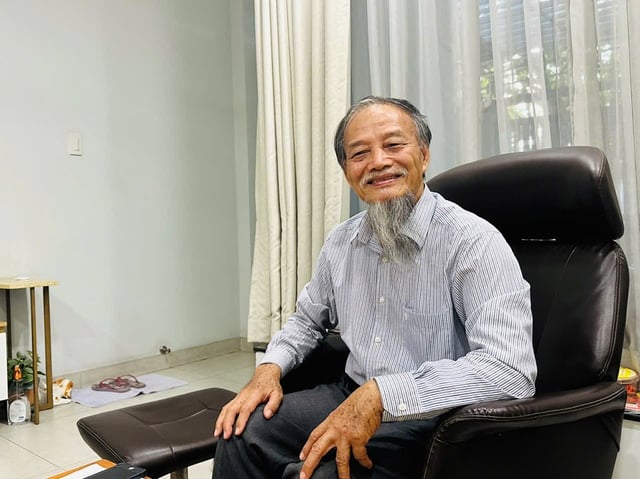
Associate Professor, Dr. Nguyen Thien Tong talks with Thanh Nien Newspaper reporter
PHOTO: HA ANH
FOR UNIVERSITY EDUCATION TO BREAKTHROUGH IN THE NEW ERA
Although Vietnamese university education has achieved many successes, as someone who has been involved in this environment for more than 50 years, Associate Professor, Dr. Nguyen Thien Tong believes that there are still many "bottlenecks" that need to be removed so that Vietnamese university education can make a breakthrough in the new era.
He shared: "Although the rate of people accessing university education is increasing, it is not enough to meet the requirements of development. A 2021 statistic shows that only 10.2% of the Vietnamese workforce has a university degree or higher. Meanwhile, to become a high-middle-income country, this rate must be at 15.3%. This shows a shortage of high-quality human resources and the need to increase the number of university graduates to one and a half times the current level. However, if universities are "forced" to increase the number, the quality issue is likely to decline. To develop, it is necessary to increase the number of university graduates, but on the other hand, it is necessary to ensure the quality of the elite and spearhead force".
Therefore, Associate Professor, Dr. Nguyen Thien Tong proposed that it is necessary to invest in developing university education in three directions.
One is to restructure the organization of large universities and scientific research institutes according to the model of multidisciplinary universities of elite research at the top of the pyramid of university education with complete autonomy. This is a place to train postgraduates with the number of people studying at the university level as much as the number of students studying at the university level to improve the quality of university education and scientific research.
Second, restructure the organization of individual specialized universities such as pedagogy, medicine, natural sciences, agriculture, forestry, engineering, architecture, economics, social sciences... according to the model of a multidisciplinary university with mass teaching in the middle of the university education pyramid with high autonomy.
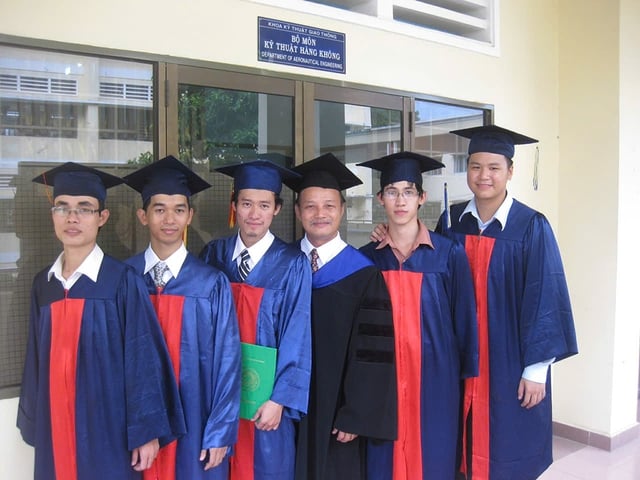
Associate Professor, Dr. Nguyen Thien Tong (middle) with aviation engineers from Ho Chi Minh City University of Technology on graduation day in 2009.
PHOTO: NVCC
Third, developing non-profit private universities also follows the model of multidisciplinary universities of teaching type.
Decision No. 192 on the education development strategy of Ho Chi Minh City strives to have the number of non-public university students reach 35% of the total number of institutions and 25% of the total number of students by 2030. Associate Professor, Dr. Nguyen Thien Tong said: "It is necessary to develop private universities in a non-profit direction. If we develop private universities for profit as it is now, we will only increase the quantity, it will be difficult to increase the quality because we are chasing revenue for profit. This direction needs to look at the model of Harvard University and many other non-profit private universities in the US."
One of the issues that needs to be adjusted, according to Associate Professor, Dr. Nguyen Thien Tong, is also related to doctoral training and scientific research activities of universities. "Doctoral studies in Vietnam are mostly done by working while studying. How can the quality be high if you work to pay tuition fees? It is necessary to widely deploy the doctoral training model in the form of scholarships equivalent to tuition fees and salaries, and doctoral students are allowed to participate as teaching assistants and researchers. Only when students are fully devoted to studying and researching can the quality of output be increased," he proposed.
Regarding the publication of scientific research articles, Associate Professor, Dr. Nguyen Thien Tong raised the question: "Many domestic universities are currently following world rankings, in which the number of international publications is considered important. But what contributions does the publication of these articles make to the development of science and technology and the socio-economy of Vietnam?". From there, he said that universities need to "join hands" with businesses in scientific research and innovation, to build research topics according to the needs of businesses, thereby putting research results into practical application instead of just doing academic research to have international publications as is currently the case.
The founder of Vietnam's aviation industry
Associate Professor, Dr. Nguyen Thien Tong is one of 50 outstanding overseas Vietnamese honored by Ho Chi Minh City on the occasion of the 50th anniversary of national reunification (April 30, 1975 - April 30, 2025) for his important contributions to the construction and development of the city.
After graduating with a doctorate in Australia, in 1974 he returned to Vietnam to work as a lecturer and assistant dean of the University of Engineering, Thu Duc Polytechnic University.
From 1975 to 1995, he was a lecturer at the Faculty of Mechanics and the Faculty of Construction, University of Technology (Ho Chi Minh City National University).
He received a Fulbright scholarship to study at Harvard University (USA) in 1992 and graduated with a master's degree in public administration in 1994.
In 1996, he became the Head of the Department of Aeronautical Engineering at Ho Chi Minh City University of Technology. With the founding of the Aeronautical Engineering Department at Ho Chi Minh City University of Technology, Associate Professor, Dr. Nguyen Thien Tong is known as the person who laid the first foundation for the Aeronautical Engineering industry in Vietnam. He held this position until 2007, when he retired.
From 2010 - 2012, he was Vice Principal of Cuu Long University.
From 2023 to present, he is the Head of the Department of Aeronautical Engineering, Van Lang University.
Source: https://thanhnien.vn/pgs-ts-nguyen-thien-tong-giao-duc-dh-vn-tung-buoc-tiem-can-quoc-te-18525042917344417.htm


![[Photo] Feast your eyes on images of parades and marching groups seen from above](https://vphoto.vietnam.vn/thumb/1200x675/vietnam/resource/IMAGE/2025/4/30/3525302266124e69819126aa93c41092)

![[Photo] Fireworks light up the sky of Ho Chi Minh City 50 years after Liberation Day](https://vphoto.vietnam.vn/thumb/1200x675/vietnam/resource/IMAGE/2025/4/30/8efd6e5cb4e147b4897305b65eb00c6f)



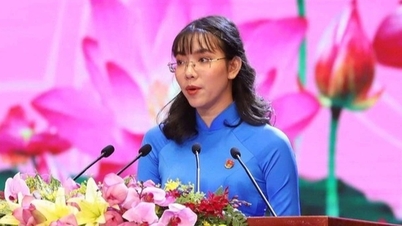
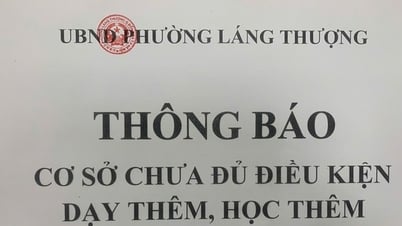

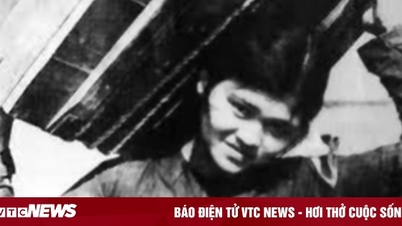
![[Video] Ho Chi Minh City to organize mock high school graduation exams at the end of May 2025](https://vphoto.vietnam.vn/thumb/402x226/vietnam/resource/IMAGE/2025/4/30/b62e7183fd9843449576840bea1d3836)










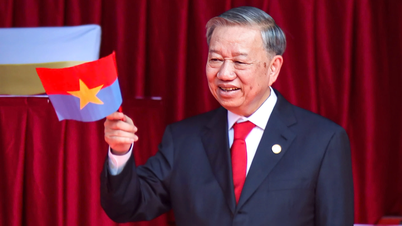




































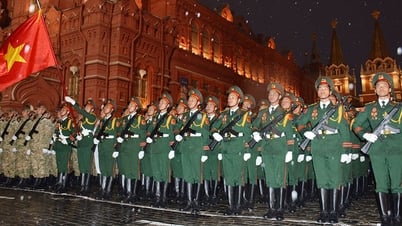










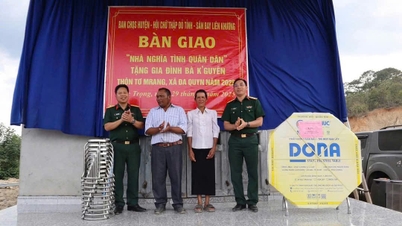

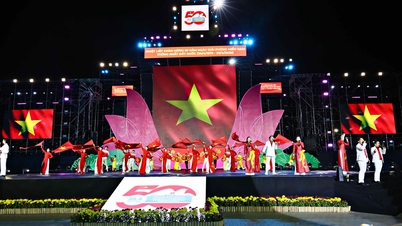
















Comment (0)